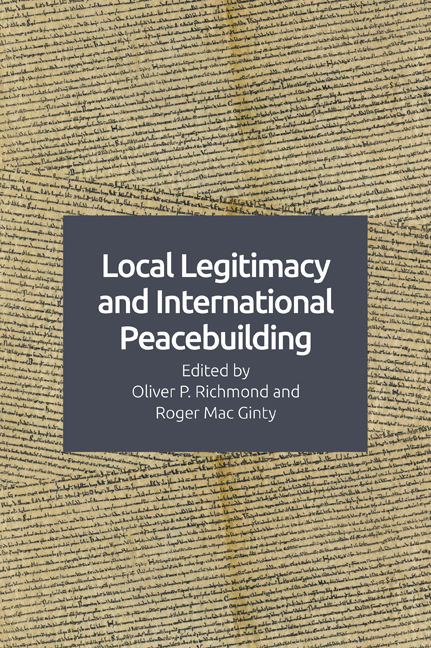Book contents
- Frontmatter
- Contents
- Contributors
- Foreword: The Riddle of Legitimacy
- Introduction: Legitimacy and Peace in the Age of Intervention
- One The Hybridization of Legitimacy in Processes of Peace Formation: the Bougainville Case
- Two International Intervention and Relational Legitimacy
- Three From a Divisive Peace Agreement to a Legitimate Peace in Colombia
- Four Banners, Billy Clubs and Boomerangs: Leveraging and Counter-Leveraging Legitimacy in the Occupied Palestinian Territory
- Five Peacebuilding as a Self-Legitimising System: The Case of Bosnia-Herzegovina
- Six ‘We Are There at Their Invitation’: Struggles for Legitimacy during the US Coalition Invasion–Occupation of Iraq
- Seven Inclusion and Performance as Sources of Legitimacy – the UN Mediation on Syria
- Eight Agonisation to Re-Legitimise the Postcolonial, Post-Conflict Somaliland
- Nine Third Party Legitimacy and International Mediation: Peacemaking through Pan-Africanism in Sudan
- Ten Post-War Legitimacy: A Framework on Relational Agency in Peacebuilding
- Eleven Legitimacy in Lebanon
- Conclusion: Peacebuilding and Legitimacy: Some Concluding Thoughts
- Index
Three - From a Divisive Peace Agreement to a Legitimate Peace in Colombia
Published online by Cambridge University Press: 17 November 2020
- Frontmatter
- Contents
- Contributors
- Foreword: The Riddle of Legitimacy
- Introduction: Legitimacy and Peace in the Age of Intervention
- One The Hybridization of Legitimacy in Processes of Peace Formation: the Bougainville Case
- Two International Intervention and Relational Legitimacy
- Three From a Divisive Peace Agreement to a Legitimate Peace in Colombia
- Four Banners, Billy Clubs and Boomerangs: Leveraging and Counter-Leveraging Legitimacy in the Occupied Palestinian Territory
- Five Peacebuilding as a Self-Legitimising System: The Case of Bosnia-Herzegovina
- Six ‘We Are There at Their Invitation’: Struggles for Legitimacy during the US Coalition Invasion–Occupation of Iraq
- Seven Inclusion and Performance as Sources of Legitimacy – the UN Mediation on Syria
- Eight Agonisation to Re-Legitimise the Postcolonial, Post-Conflict Somaliland
- Nine Third Party Legitimacy and International Mediation: Peacemaking through Pan-Africanism in Sudan
- Ten Post-War Legitimacy: A Framework on Relational Agency in Peacebuilding
- Eleven Legitimacy in Lebanon
- Conclusion: Peacebuilding and Legitimacy: Some Concluding Thoughts
- Index
Summary
Introduction
In December 2016, one of the world's longest and most damaging armed conflicts came to an end. More than eight million victims later, the Government of Colombia and the FARC-EP guerrilla (Revolutionary Armed Forces of Colombia – People´s Army) signed a peace agreement that was negotiated over five years in Havana, Cuba. After three years of implementation, important progress has been made in the development of the agreed commitments, as observed by two of the independent institutions invited to support the verification and evaluation of the implementation: the Kroc Institute for International Peace Studies and the United Nations Political Mission. In this period, the armed conflict between the Government of Colombia and the FARC ended, despite some significative splitting dissidences, and the guerrilla has become a democratic political actor that competes in elections. Much of the agreement remains to be implemented, however, and many difficulties to be overcome still lie ahead.
In this paper, I explore the concept of territorial peace through a legitimacy- building lens. The article's main thesis is as follows: in order to achieve a higher quality peace in Colombia, and to overcome the deep division and polarisation that the armed conflict generated – and which has been maintained throughout the peace process – territorial peace needs to pay special attention to the legitimacy of the state in the territories most affected by the armed conflict, as well as drug trafficking and illicit economy dynamics. In this sense, legitimacy is not something that is automatically derived from Colombia's status as a well-integrated democratic state within the international political order. Rather, it is something that must be built and developed through direct interaction and dialogue with the communities that suffer the violence, the pressure of the illegal armed actors, and the historical absence of the state.
Throughout the paper and its conclusions, I present the peace agreement and its implementation process as the basis for a transformative peace in Colombia; a peace that may help the country to overcome the main causes of the armed conflict and consolidate state legitimacy across the national territory, and in the face of pressure from diverse networks of legal and illegal actors that compete with the state. These actors are often more effective at building political authority and popular following than the state.
- Type
- Chapter
- Information
- Local Legitimacy and International Peace Intervention , pp. 69 - 93Publisher: Edinburgh University PressPrint publication year: 2020

